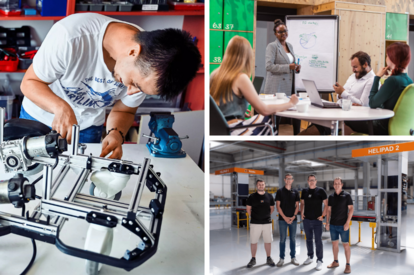
Peer learning can help you make better decisions, expand your network, and seize new opportunities as an entrepreneur. Check out our 5 tips to make the most of it and see how the Enterprise Europe Network has helped dozens of businesses grow together over the years.
What is peer learning?
Peer learning helps entrepreneurs share knowledge, skills, and resources with others who’ve faced similar challenges. Unlike formal education, which follows strict schedules and curriculums, peer interactions provide practical, real-time advice for tackling specific business problems.
This kind of learning also builds a strong support network. Business owners stay motivated and engaged when they connect with people who understand their struggles and successes. Peer learning is more affordable and flexible than traditional mentoring or professional services, too; entrepreneurs get support without breaking the bank or being tied down by formalities.
Here are 5 ways to make the most of peer learning:
1. Borrow ideas and turn them into your own ‘aha!’ moment
Peer learning connects you with entrepreneurs from diverse industries and career stages. This mix of perspectives can spark ideas you might not have considered on your own.
In his book Borrowing Brilliance, David Murray explains that new ideas aren’t created from scratch but are often a combination of existing concepts reassembled in innovative ways: “Borrowing brilliance means building on the ideas of others, and so your creative ability is based on your ability to define a problem and then use that problem as a map to find the ideas of others. It’s from this material that you’ll find a metaphor, a way to structure your new idea in terms of an existing idea.”
Many innovative products and services came from adapting ideas from different fields. Dyson’s bagless vacuum cleaner was inspired by a sawmill’s dust separation system. Nike Air technology was born when former NASA engineer Frank Rudy applied space suit innovations to design cushioned shoe soles. A London children hospital improved its patient handoff process by learning from Ferrari’s Formula One pit crew, which helped the intensive care team slash medical errors.
In the same way, entrepreneurs can upgrade their products or services by borrowing successful ideas from other industries. For example, a restaurant might grow its customer base by embracing digital marketing tactics from e-commerce, while a tech entrepreneur could revamp a fitness app by weaving in game design elements.
2. Tap into collective wisdom for smarter decisions
Peer learning helps entrepreneurs make better decisions by offering fresh perspectives and practical advice. According to a Deloitte report, diverse thinking can improve decision-making quality by 20% and cut risk by 30%. Connecting with people from different industries often uncovers new ideas and helps you avoid common pitfalls.
Real-time feedback is another big advantage of peer learning. In peer support groups or start-up communities, you can ask questions to get quick, hands-on answers. This input helps you make confident decisions and fix issues early. Peers also share valuable resources, tools, and connections, that can speed up your business growth.
Emotional support is essential as well. Talking with others who understand your ups and downs boosts your confidence and gives you encouragement. Industry groups offer a safe space where founders can openly share their challenges and get actionable advice from fellow entrepreneurs.
3. Find a mentor
Mentors are essential for entrepreneurs at any stage, whether they’re just starting out or scaling up. With a mentor, you’re five times more likely to succeed and see higher revenues, and three times more likely to stay in business.
Industry mentors offer specific insights that help you overcome challenges. For example, a healthcare mentor can guide a medical startup through patient privacy laws and clinical requirements. Mentors from other fields bring fresh perspectives and valuable connections. A finance expert can help manage your startup’s budget, while a marketing professional can suggest strategies to boost your online presence.
Beyond advice, mentors can amplify your brand by advocating for your products within their network. They might introduce you to major retailers, help you secure features in industry publications, or land a guest spot on a popular podcast. This support increases your visibility and builds trust with new audiences.
4. Get an accountability partner
Peer learning can help you find an accountability partner by connecting you with like-minded entrepreneurs who share similar goals and challenges. In collaborative learning environments, such as mastermind groups or startup communities, these relationships often form naturally. Knowing that someone else is aware of your goals and progress makes you more likely to follow through on your commitments. For instance, a study by the American Society of Training and Development found you’re 65% more likely to succeed when you make a commitment to someone and your chances jump to 95% with regular check-ins.
External support is key when you're facing challenges that might cause procrastination or a loss of focus. For instance, if you’re struggling to complete an important business plan, an accountability partner can help keep you on track with regular feedback. Similarly, if launching a new product feels overwhelming, joining an industry group can provide the encouragement and motivation you need to stay focused.
5. Expand your network for new opportunities
Peer learning is a great way to expand your network and connect with people who share your interests. By joining workshops or group chats, you meet others who are also excited to learn and grow. These shared experiences create real, deeper relationships than go beyond just swapping business cards.
Peer learning broadens your network beyond your usual circle by connecting you with a diverse group of professionals, including potential collaborators, mentors, and industry leaders who can advance your career.
Peer learning also boosts your reputation and visibility. By sharing your knowledge and supporting others, you position yourself as a thought leader. Engaging in forums or hosting events on LinkedIn, for example, can make you stand out and attract valuable collaboration opportunities.
How Enterprise Europe Network encourages peer learning: Peers4Growth
Peers4Growth is changing the way start-ups and scale-ups connect and grow. Since 2019, this Enterprise Europe Network project has helped dozens of businesses learn from each other, share successful strategies, and tackle challenges together. The goal? To boost the global competitiveness of European small companies and accelerate their growth.
The initiative is led by four Network partners: VLAIO in Belgium, IVACE in Spain, Zenit in Germany, and the Netherlands Enterprise Agency. These organisations collaborate to host events such as workshops and webinars, giving entrepreneurs opportunities to exchange ideas and experiences. Over six editions, Peers4Growth has focused on key business topics like resilience, innovation, sustainability, and market expansion.
In 2024, Peers4Growth took part in the World Circular Economy Forum in Brussels, where it hosted a full day of workshops on circularity. Nine start-ups from various sectors, including logistics, pharma, and textiles, participated in over 150 matchmaking meetings, both online and in person, connecting with peers and potential investors.
Aaron Thierens, founder of Re-Sound, a Belgian company specialising in acoustic office furniture, shared: "Exchanging with fellow entrepreneurs in this setting has been incredibly enriching. I’m excited to see where these new connections will take us."
José Raúl Martínez Vázquez, CEO of Hydronik, which creates energy-saving systems using big data and AI, added: "The learning experience here has been exceptional. I’m proud to be part of this community and engage with such a diverse group of founders."
"The Peers4Growth workshop is accelerating our progress," said Lisanne Peters, founder of SymbioMatter in the Netherlands. "It helped us better understand our milestones and focus on executing them."
Peers4Growth plans to expand its support for start-ups across Europe, building a strong community of entrepreneurs through peer learning and networking. Want to join us? Reach out to your local contact point and get started today!
Mylène Hoogendijk-Mesters is a Senior Business Adviser at the Netherlands Enterprise Agency and serves as Vice-Chair of the Enterprise Europe Network’s communications expert group.
The article was co-authored by Ruxandra-Laura Bosilca, PhD, Social Media and Community Manager for Enterprise Europe Network, and Luka Marie Sauer, Blue Book Trainee at EISMEA.
Related articles

In a world of saturated markets and shrinking attention spans, innovative SMEs must go beyond great products: they need smart, strategic communication to succeed globally. Discover five powerful tips...

Starting a business on a tight budget? You don’t need a huge marketing budget to see real results. In this article, we’ll share 4 affordable marketing strategies for small businesses, showing you how...

Is Texas your next big opportunity? You’re probably thinking of sizzling fajitas, rugged cowboys, or the sweet sound of Willie Nelson strumming his guitar. Well, Texas has all of that, but it’s also...

Start-ups need funding, mentorship, and networks to scale. Big companies are looking for fresh ideas, disruptive tech, and faster ways to stay ahead. When they join forces, both sides win. Keep...
